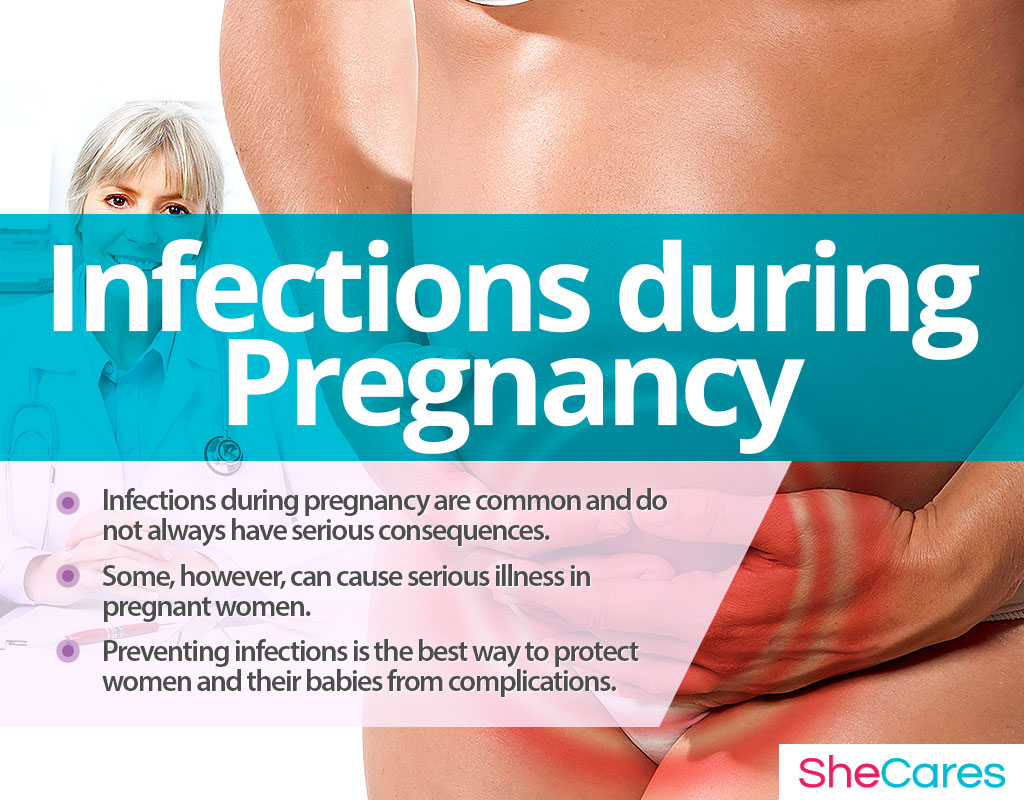What Causes Infections during Pregnancy?
Generally, infections can be caused by four microorganisms: bacteria, viruses, fungi, and parasites. They can be transmitted through direct or indirect contact, such as:
Inhalation of airborne germs
Ingestion of contaminated food or water
Placental transmission
Illicit drug use
Unprotected sexual contact
During pregnancy, hormonal fluctuations and numerous physiological changes might affect how the immune system works, making women more susceptible to certain infections, such as vaginal yeast infections or bacterial vaginosis.
Risk Factors for Infections during Pregnancy
Several risk factors have also been associated with weakening women's immune system and making them more prone to contracting infections:
Medications, such as steroids
Maternal chronic conditions, such as HIV, AIDS, lupus, or cancers
Smoking or alcohol abuse
Poor nutrition and vitamin deficiencies
Insufficient vaccination
Prolonged stress
Depression
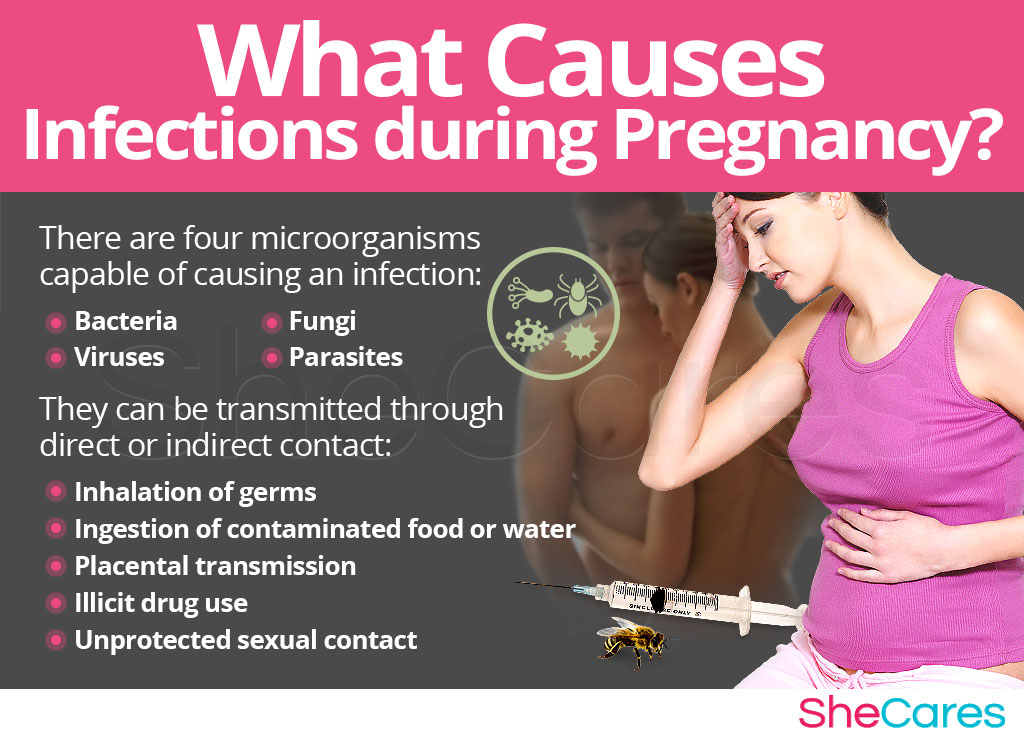
Common Infections during Pregnancy
While there are a number of infections that can complicate the progression of pregnancy, the most common ones include:
Urinary tract infection. It is caused by bacteria, such as E. coli, and it might affect the kidneys, ureters, urethra, and bladder.
Vaginal yeast infection. It is a common fungal infection that is caused by hormonal changes during pregnancy.
Influenza (flu). It is an infectious disease caused by a virus, which affects the respiratory tract.
Cytomegalovirus (CMV). It is a viral infection that is spread through body fluids, like blood, saliva, or semen.
Listeriosis. It is a bacterial infection from eating contaminated food, such as uncooked meat or fish as well as raw vegetables and unpasteurized dairy.
Toxoplasmosis. It is a parasitic infection most commonly transmitted through cat's feces while changing litter.
Chickenpox and rubella. Both infections are caused by viruses. Most women are vaccinated against them in childhood, but those who have not been can transmit the virus to the fetus.
Sexually transmitted diseases (STDs). Even though STDs can be easily managed before pregnancy, if they are contracted while you are pregnant, they can lead to serious complications.
Bacterial vaginosis (BV). It arises from a disturbance in normal bacterial flora in the vagina. It can be exacerbated through sex.
Group B strep. It's a bacterial infection that can be passed on from the mother to the child during delivery.
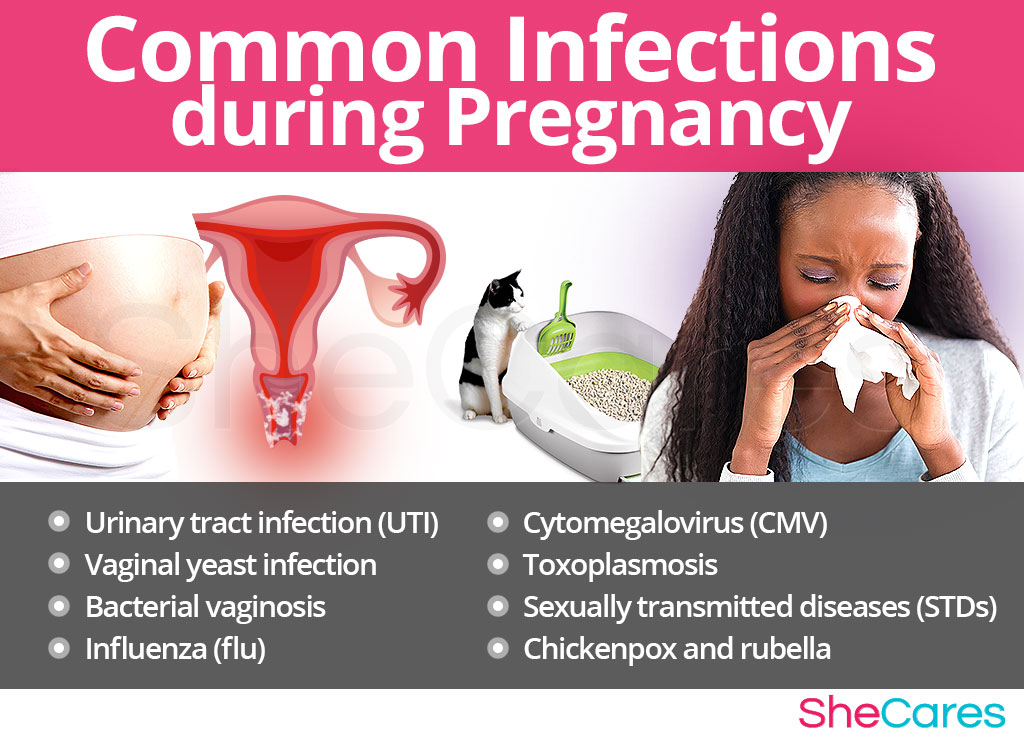
Signs and Symptoms of Infections during Pregnancy
Although various infections might manifest themselves in many ways depending on the causal organism, following are the general signs of infection:
Fever
Pain, muscle aches, and fatigue
Swollen lymph nodes
Coughing and chest tightness
Nausea, vomiting, or diarrhea
Heat at the site of infection
Redness, rash, swelling, or pus
- Vision abnormalities
If you notice any of these signs and symptoms, seek immediate medical attention to get promptly diagnosed and treated.
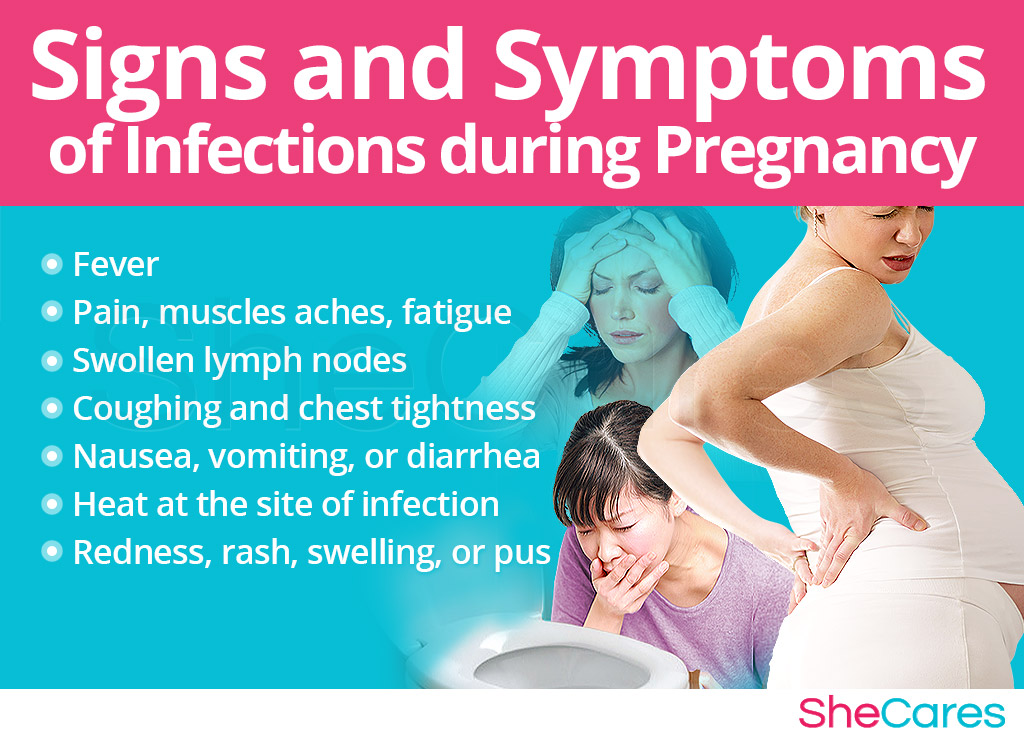
Tests for Infections during Pregnancy
The presence of contagious agents in the body can be detected with a wide range of diagnostic tests. Depending on the type of infection, they might include the following:
Labs: Blood test, urine test, culture swab, stool sample, or spinal tap
Imaging: X-ray, magnetic resonance, or CAT scan
Biopsy
It is worth mentioning that women are routinely screened for signs of infections and the presence of some of the most common pathogenic microorganisms throughout their pregnancy. This includes taking urine samples to detect UTIs or culture swabs to rule out group B strep, and more.
How Infections during Pregnancy Affect the Baby
Not all infections during pregnancy endanger the life of the baby. Yeast infections, for example, are very common and do not negatively affect your or your baby's health. Others, however, might lead to a wide range of serious complications, such as:
Low birth-weight
Birth defects leading to mental retardation and vision or hearing loss
Infections such a pneumonia or meningitis, sometimes leading to sepsis
It is important to keep in mind that certain medications used to treat infections during pregnancy might also have certain side effects that are harmful to the baby.
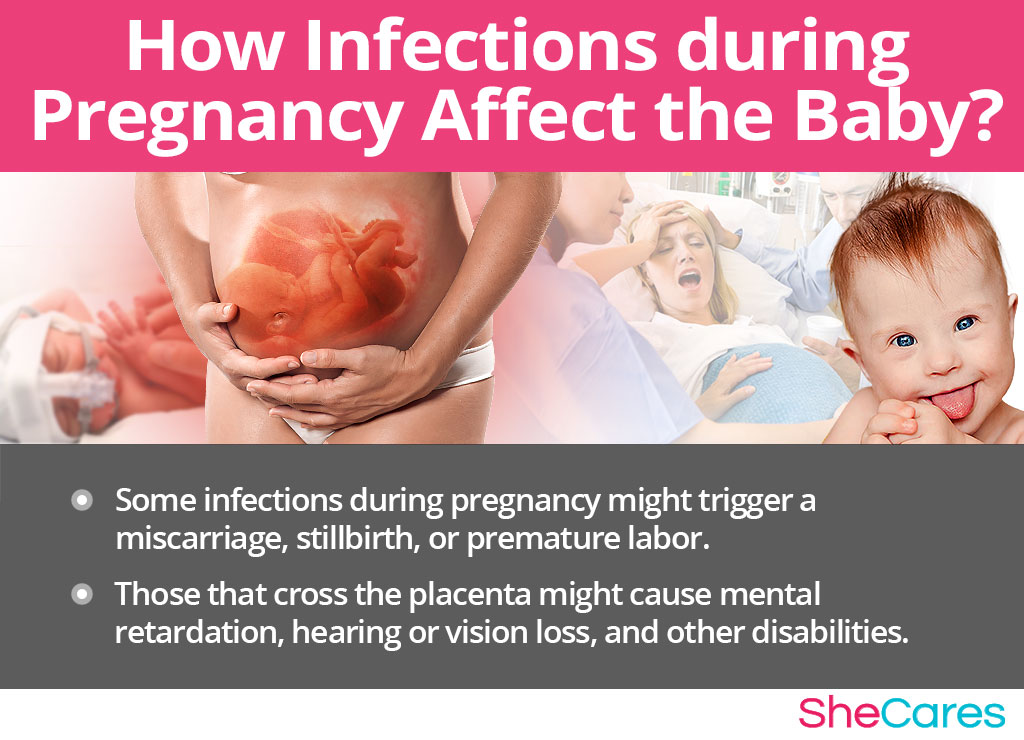
Risk Reduction for Infections during Pregnancy
Preventing infections during pregnancy is the best way to avoid potentially life-threatening complications. Consider the following recommendations:
Wash your hands, especially after using the bathroom, handling raw meat, or playing with pets and before eating.
Do not eat uncooked meat or unpasteurized products.
Check if your vaccinations are up-to-date.
Do not clean the cat's litter box while you're pregnant.
Practice safe sex or abstain from it during pregnancy.
Don't share your personal items, such as toothbrushes or razors.
Be cautious traveling and avoid large crowds, especially during winter time.
Treatment and Management of Infections during Pregnancy
The choice of treatment during pregnancy depends on the type of infection you have. Most infections have to be treated with medications, but supporting your body with proper diet and natural remedies is equally important. Your treatment might, therefore, include the following:
Medications
Depending on the type of the organism causing an infection, you might be prescribed antibiotics or antiviral, anti-fungal, or anti-parasitic drugs. Your doctor will make sure that they can be safely taken during pregnancy.
Rest
Your body uses up all its immunological resources to fight an infection. So, it is crucial to get as much rest as you can while you are on a treatment regimen. Remember to get enough sleep and avoid strenuous physical activities.
Eat well and stay hydrated
Support your immune system in battling the infectious agents by consuming a nutrient-rich diet full of fruits, vegetables, and whole grains as well as healthy proteins and fats.
Natural remedies
Since the risk of serious complications from leaving your infection untreated during pregnancy is too high, natural remedies should not replace conventional treatment. They can, however, serve as supporting therapies. Consider the following:
- Garlic, cinnamon, ginger, and honey have anti-microbial properties and can give your immune system a good boost.
- Probiotics in yogurt or sauerkraut can replenish the good bacteria in your guts, strengthening your immunity.
- Echinacea is a known booster of your body's natural defense mechanism, helpful in alleviating a number of infections.
- Oregano has anti-fungal and antiviral abilities and can be used in an infusion or in an oil form.
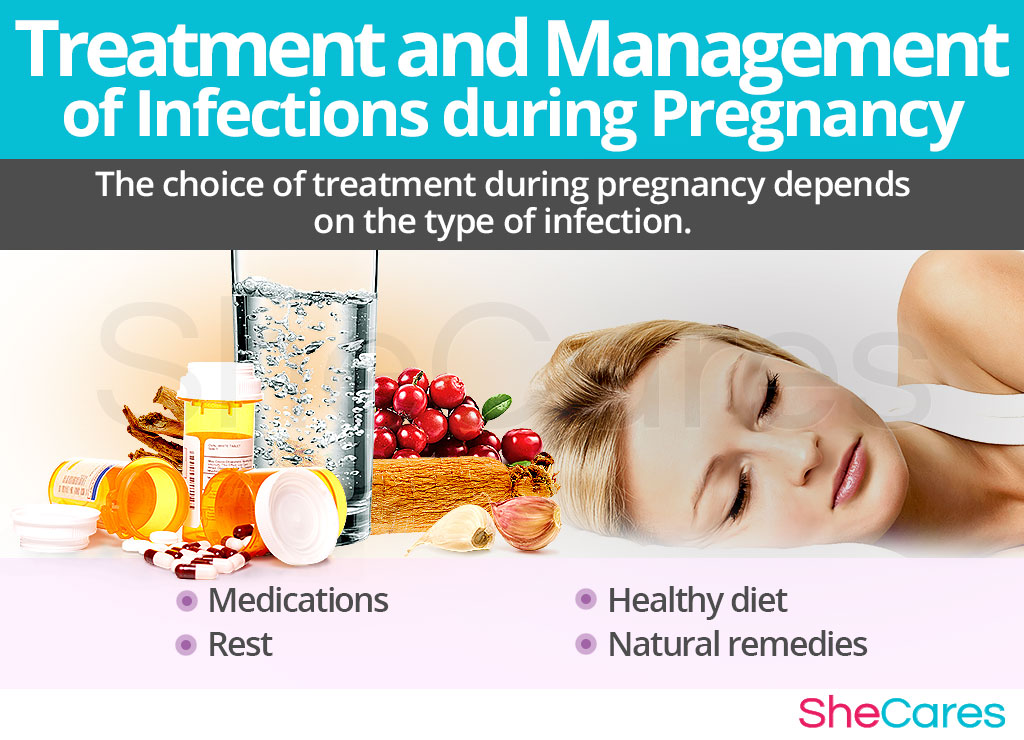
Key Takeaways
Although the thought of having an infection during pregnancy might be terrifying to mothers-to-be, most common infectious diseases do not have an ability to harm the baby and can be effectively cured without causing complications. Implementing standard prevention methods along with a well-balanced diet and other healthy lifestyle practices can successfully shield you and your baby from problems during pregnancy and beyond.
Sources
- CDC. (2017). 10 Tips for Preventing Infections Before and During Pregnancy. Retrieved January 22, 2018 https://www.cdc.gov/pregnancy/infections.html
- CDC. (2017). Pregnancy Women and Influenza. Retrieved January 22, 2018 from https://www.cdc.gov/flu/protect/vaccine/pregnant.htm
- The New England Journal of Medicine. (2014). Pregnancy and Infection. Retrieved January 22, 2018 from https://www.ncbi.nlm.nih.gov/pmc/articles/PMC4459512/
- Archives of Medical Science. (2015). Urinary tract infections in pregnancy: old and new unresolved diagnostic and therapeutic problems. Retrieved January 22, 2018 from https://www.ncbi.nlm.nih.gov/pmc/articles/PMC4379362/
- Medline Plus. (2017). Infections and Pregnancy. Retrieved January 22, 2018 from https://medlineplus.gov/infectionsandpregnancy.html
- Women's Health. (2017). Pregnancy complications. Retrieved January 22, 2018 from https://www.womenshealth.gov/pregnancy/youre-pregnant-now-what/pregnancy-complications
- Food Safety. (n.d.). Food Safety for Pregnant Women. Retrieved January 22, 2018 from https://www.foodsafety.gov/risk/pregnant/index.html
- Michigan Medicine University of Michigan. (2016). Vaginal Yeast Infection During Pregnancy. Retrieved January 22, 2018 from http://www.uofmhealth.org/health-library/hw79515
- Government of South Australia. (2017). Urinary Tract Infections in Pregnancy. Retrieved January 22, 2018 from http://www.sahealth.sa.gov.au/wps/wcm/connect/4bf52c004eee77c8bfa3bf6a7ac0d6e4/Urinary+Tract+Infections+in+Pregnancy_PPG_v3.0.pdf?MOD=AJPERES&CACHEID=ROOTWORKSPACE-4bf52c004eee77c8bfa3bf6a7ac0d6e4-lNSaeL2
- Mayo Clinic. (2018). Infectious disease. Retrieved January 22, 2018 from https://www.mayoclinic.org/diseases-conditions/infectious-diseases/symptoms-causes/syc-20351173
